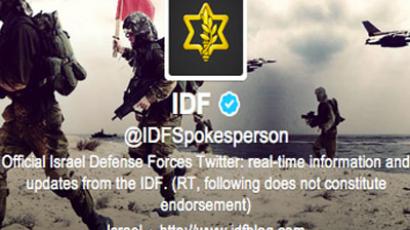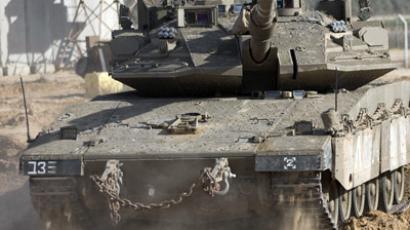Israel-Gaza conflict expands to war of words on social media
As the IDF’s bombardment of Gaza continues into its seventh day, both Hamas and Israel are waging a digital war to shape public opinion. Both sides have made extensive use of social media as a platform for warmongering rhetoric.
“Today there is a battle, a campaign online, offline in the electronic media for the hearts and minds of public opinion, it’s very, very important,” Paul Hirschson from the Israeli Ministry of Foreign Affairs told RT. There has been an escalation in warmongering rhetoric in the Israeli press over the last week, inciting hostility and undermining negotiation efforts in Cairo. “Israel is lying to its people. The Israeli reporters are inflaming the situation, there is a huge incitement from army analysts,” Muhammad Abed Alkader, an Arabic student from Tel Aviv university told RT. Another student named Rula Khalaeleh echoed those sentiments, criticized the Israeli media’s coverage of the conflict as insulting. Citing the botched IDF air strike that killed an entire family in Gaza on Sunday, she said Israel’s press had justified the deaths by treating every Palestinian like a potential future Hamas member.A digital war has arisen following the flurry of activity on social media over the IDF’s initial strike that killed Hamas military leader Ahmed Jabari last Wednesday. Following the attack, the IDF not only tweeted a warning threatening that other Hamas members could meet a similar end, they also posted a video of the attack on YouTube.“We recommend that no Hamas operatives, whether low level or senior leaders, show their faces above ground in the days ahead,” the IDF wrote on Twitter following the assassination.The IDF has offered wide-ranging coverage of its operations in Gaza, providing running commentary and content on Twitter, Instagram and YouTube.
Political analyst Ron Pundak told RT that Israel’s “ability to prolong the conflict is based on how it is being perceived internationally.”“Interestingly enough this war provides less pictures than for example the 2008-2009 war, which was taking place in Gaza,” Pundak told RT. He argued that the only reason why there are fewer casualties than in Israel’s last incursion is because Israel “would like that the Palestinians have less pictures of the war.” Hamas has used social media to saber-rattle as well. Following the attack that killed 11 civilians on Sunday, the group posted a message online promising to exact revenge on Israel. And Hamas’ paramilitary wing, Al Qassam, has been accused of uploading photos of dead Syrian children onto their Twitter page in an attempt to pass the images off as showing Palestinian victims of the conflict.Israel has also sought to silence Hamas’ media voice, bombing the building which houses TV station Al Aqsa on Monday. Before that, the IDF struck al-Quds TV, a channel Israel has accused of being a vehicle for Hamas propaganda. The IDF described the targeting of television outlets as attacks on “communications antenna used by Hamas to carry out terror activity against the state of Israel.”Journalist Gilad Sharon, son of Israel’s ex-Prime Minister Ariel Sharon, wrote in a blog in the Jerusalem Post that Israel should “flatten Gaza.” He called for drastic action by the IDF, arguing that all of Gaza was complicit in the conflict since its residents had democratically elected Hamas.














